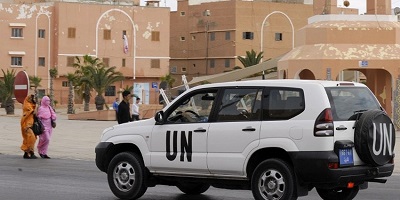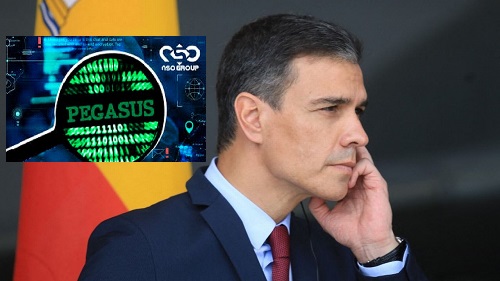Tags : Qatargate, European Parliament, Antonio Panzeri, Eva Kaili, Marocleaks, Western Sahara,
The bargaining chip between Morocco and MEPs is the Saharawi people
LUCA ATTANASIO
At the centre of the Moroccan strand of the scandal that has engulfed the European Parliament is the Western Sahara issue. Rabat aimed to bribe parliamentarians and officials to circumvent the EU Court of Justice ruling safeguarding the Saharawis’ right to profits from the resources of their territory.
At the centre of the Moroccan strand of the scandal that has engulfed the European Parliament is the Western Sahara issue.
Rabat aimed to bribe parliamentarians and officials to circumvent the EU Court of Justice ruling safeguarding the Saharawis’ right to profits for the resources of their territory.
« Something always happens in the European parliament, » explains Fatima Mahfoud, Polisario’s representative in Italy, « that interrupts proceedings favourable to our demands. And so far, as the Maroc-Leaks show, Che Panzeri was crucial in Morocco’s lobbying in the EU.
For Noam Chomsky, it was they in October 2010 who triggered the Arab Springs. Ahead of the Tunisians, the Saharawis brought 20,000 activists to Gdeim Izik, in the middle of the southern Moroccan desert, to demonstrate peacefully and demand respect for rights from Rabat.
The ‘Sahrawi spring’ was bloodily repressed by the Moroccan police forces and their cause sank again amidst the utter disregard of the world.
Today, the issue of Western Sahara, Africa’s last colony by Africans, resurfaces for yet another chapter of rights frustration.
A bargaining chip, the Saharawis are said to be the sacrificial victims of shady dealings between European parliamentarians and Moroccan officials interested in maintaining the status quo of EU-Morocco trade put in serious jeopardy by an EU Court of Justice ruling in 2016.
THE COURT REJECTS EU-MOROCCO AGREEMENTS
The legal body had rejected the trade agreements between Europe and Rabat precisely because of the area of Western Sahara, which is rich in phosphates and very rich in fish, and demanded that any future signature be made with the consent of the Polisario Front, the political body representing the Saharawis.
The Court’s ruling, however, was substantially bypassed by the European Commission, which re-proposed the contents of the previous text without any substantial changes and, above all, without involving the Saharawis. And when in 2019 the texts of the new agreement were approved by a large majority in parliament, the Polisario lodged an appeal and received a new assent from the Court, which in 2021 invalidated all agreements. Despite this, the parliament again approved the trade agreement with Morocco and the new appeal lodged by Polisario is expected to be answered in 2023.
For years, one wondered how it was possible for the European parliament and commission to circumvent rulings of the European Court of Justice. Today, the first answers are emerging. For some time now, the powerful Moroccan lobbying system has been on the lookout for MEPs who tend to be close by political vocation to oppressed peoples or those deprived of fundamental rights in order to convince them, through licit and illicit methods, to shift support and votes in favour of Rabat’s interests. In this way, they allow a stable political and commercial relationship between the EU and Morocco and de facto erase the demands, ratified in this case by the Court of Justice, of the Saharawis.
‘Something always happens in the European Parliament,’ explains Fatima Mahfoud, Polisario’s representative in Italy, ‘that interrupts proceedings favourable to our demands. We had a last example last 14 December: following the Qatar gate a motion was voted to limit lobbying and the left tabled an amendment to extend it to Morocco as well, but the overwhelming majority voted against it’.
THE ‘FRIENDS’ OF MOROCCO
Among the most active in guiding the choices of the parliament and the committee is, as is well known, Pier Antonio Panzeri, head of the EU-Morocco joint committee from 2010 to 2014 and president in his third term 2014-2019, of the delegation for relations with the Maghreb and the Arab Maghreb Union, including the EU-Morocco, EU-Tunisia and EU-Algeria joint parliamentary committees.
His relations with Abderrahim Atmoun, Morocco’s ambassador to Poland, and a man who exerted great pressure on the EU to avert the downsizing of Morocco-Europe trade relations, as well as those between Moroccan emissaries and parliamentarians, among whom, as the Belgian judiciary would have us believe, in addition to Panzeri, there would be Cozzolino and Vice-President Kalili, are now being examined by the investigators. That Panzeri was crucial in lobbying Morocco in the EU is demonstrated by many of the texts revealed by Maroc-leaks.
One among many, from 2014, from the Moroccan Foreign Ministry’s Directorate for Relations with the EU reads in one passage, ‘Federica Mogherini … will lead European diplomacy …Coming from the Pd, which supported the motion against Morocco in the Italian parliament, she has adopted positions favourable to the separatists’ arguments on the Sahara issue. It is therefore necessary to act with Morocco’s friends (senior European officials and members of the Socialists & Democrats party, in particular Pargneaux and Panzeri) to make her aware of this issue… »
THE SAHARAWI NATION ONLY FOR THE SOUTHERN HEMISPHERE
For half the world – the African Union and almost all African countries, many American and Asian countries – the desert people, settled for centuries between southern Morocco, Mauritania and the Atlantic Ocean, is a nation – the Saharawi Arab Democratic Republic (Rasd) – with a government and a parliament (in exile in Tindouf, Algeria, ed). For the other planetary hemicycle, however, it is no more than the extreme southern offshoot of Morocco. Spanish Sahara until 1975, the early 1960s saw the establishment of united independence groups under the Frente Polisario banner.
The organisation, Spain having left the scene in 1976, presented its demands for self-determination to the United Nations. But it was Morocco that took advantage of the political vacuum left by Spain: on 6 November 1975, King Hassan II ordered more than 300,000 of his subjects, protected by 20,000 soldiers, to occupy the region to the south.
Since then, the people of the desert have experienced exile and gradual fragmentation: a large portion lives in what Rabat considers to be its last southern region; another, much smaller portion lives in a strip of impassable land conquered by the Polisario army, called Liberated Territories, beyond the longest wall in the world, 2,700 kilometres, erected by Morocco and littered with mines; finally, about 200,000 people populate the refugee camps of Tindouf, Algeria.
After decades of conflict, which Polisario faced with the support of Algeria, a UN agreement was reached in 1991 that, in addition to a truce, provided for the immediate organisation of a referendum on self-determination. More than 30 years have passed and that consultation is still waiting to be held.
The demands of the Sahrawi people continue to be frustrated even when decisive bodies such as the EU Court of Justice accepts and supports them.
« We are going to the January congress, » Mahfoud said again, « in a state of war after Morocco violated the ceasefire in 2020, and we learn with great sadness that we have been used as a bargaining chip by parliamentarians from an institution on which we put a lot of trust. We hope that this scandal will finally open the eyes of many’.
One among many, from 2014, from the Moroccan Foreign Ministry’s Directorate for Relations with the EU reads in one passage, ‘Federica Mogherini … will lead European diplomacy …Coming from the Pd, which supported the motion against Morocco in the Italian parliament, she has adopted positions favourable to the separatists’ arguments on the Sahara issue. It is therefore necessary to act with Morocco’s friends (senior European officials and members of the Socialists & Democrats party, in particular Pargneaux and Panzeri) to make her aware of this issue… »
THE SAHARAWI NATION ONLY FOR THE SOUTHERN HEMISPHERE
For half the world – the African Union and almost all African countries, many American and Asian countries – the desert people, settled for centuries between southern Morocco, Mauritania and the Atlantic Ocean, is a nation – the Saharawi Arab Democratic Republic (Rasd) – with a government and a parliament (in exile in Tindouf, Algeria, ed). For the other planetary hemicycle, however, it is no more than the extreme southern offshoot of Morocco. Spanish Sahara until 1975, the early 1960s saw the establishment of united independence groups under the Frente Polisario banner.
The organisation, Spain having left the scene in 1976, presented its demands for self-determination to the United Nations. But it was Morocco that took advantage of the political vacuum left by Spain: on 6 November 1975, King Hassan II ordered more than 300,000 of his subjects, protected by 20,000 soldiers, to occupy the region to the south.
Since then, the people of the desert have experienced exile and gradual fragmentation: a large portion lives in what Rabat considers to be its last southern region; another, much smaller portion lives in a strip of impassable land conquered by the Polisario army, called Liberated Territories, beyond the longest wall in the world, 2,700 kilometres, erected by Morocco and littered with mines; finally, about 200,000 people populate the refugee camps of Tindouf, Algeria.
After decades of conflict, which Polisario faced with the support of Algeria, a UN agreement was reached in 1991 that, in addition to a truce, provided for the immediate organisation of a referendum on self-determination. More than 30 years have passed and that consultation is still waiting to be held.
The demands of the Sahrawi people continue to be frustrated even when decisive bodies such as the EU Court of Justice accepts and supports them.
« We are going to the January congress, » Mahfoud said again, « in a state of war after Morocco violated the ceasefire in 2020, and we learn with great sadness that we have been used as a bargaining chip by parliamentarians from an institution on which we put a lot of trust. We hope that this scandal will finally open the eyes of many’.
Domani, 19/12/2022
#Qatargate #Maroc #Parlement_Européen #Eva_Kaili #Antonio_Panzeri #Francesco_Giorgi #Qatar #Marocleaks #Mohamed_Belahrach #Moroccogate #DGED #Yassine_Mansouri

